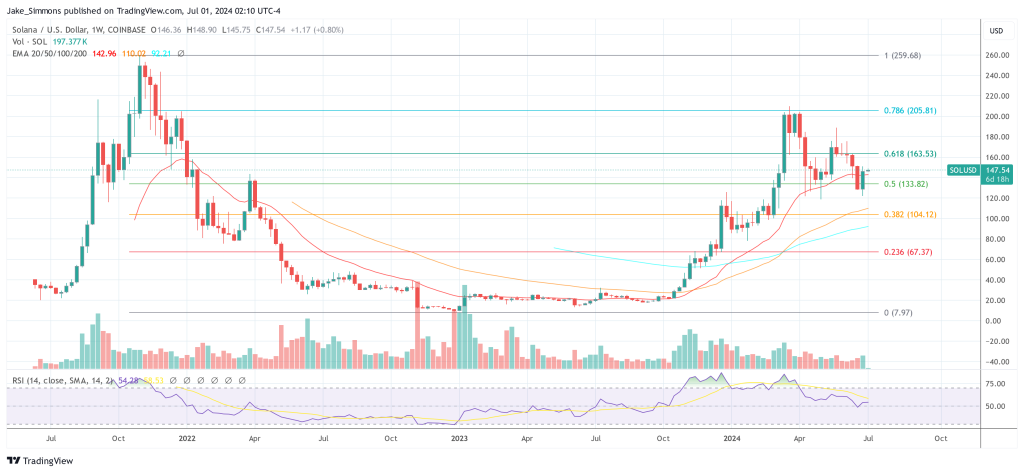Alex Thorn, head of research at Galaxy Digital, recently gave a analysis on the submissions for spot Solana Exchange Traded Products (ETPs) by investment firms VanEck and 21Shares. This filingsmade with the U.S. Securities and Exchange Commission (SEC) on June 28, represent an aggressive move to integrate Solana (SOL) into the structured framework of regulated financial markets, similar to that for Bitcoin and Ethereum.
VanEck’s proposal, as outlined in their S-1 document, aims to launch a commodity-based trust that will hold Solana directly, allowing the ETP to closely track the market price of the asset. Unlike some crypto ETPs, this product will not involve staking the assets it holds.
Following the announcement, the market reacted positively, with SOL’s price rising around 8%. However, the submission is still in its early stages and detailed operational structures such as custodian, cash custodian and authorized participants are missing. These aspects are typically addressed in later changes as the product moves closer to final approval.
Why the chances of a Spot Solana ETF are small
According to the latest updates, VanEck has not yet filed the required 19b-4 form, which triggers the SEC’s formal review process. According to Bloomberg’s analyst James Seyffart, the typical review period, once started, is up to 240 days. So if VanEck files soon, the final decision can be expected around March 15, 2025. This process includes several regulatory checkpoints and public comment periods that are standard to the approval workflow for new financial products.
The SEC currently considers Solana an unregistered security, primarily based on the ongoing lawsuit against major cryptocurrency exchange Coinbase. This classification complicates the approval process for a Solana-based ETP. Given that the Securities & Exchange Commission is currently alleging Solana is an unregistered security in its case against Coinbase, it is likely that this application will be denied unless the SEC makes a substantive change in posture,” Thorn said.
Historically, the SEC has taken a cautious approach toward crypto ETPs. The approval process generally follows a sequential path, starting with regulated futures markets, then ETPs based on those futures, and finally US-based spot ETPs. Bitcoin and Ethereum ETPs have navigated this path with varying degrees of resistance and success.
Significantly, the SEC’s previous refusal to approve Bitcoin ETPs was based on concerns about market size and oversight. The turning point came with a DC Circuit Court of Appeals verdict in August 2023, which supported the adequacy of supervision of the futures market. This ruling facilitated the adoption of Bitcoin spot ETPs, which began in January 2024, followed by Ethereum ETPs in May 2024.
The odds can change quickly
The recently passed FIT21 law in the U.S. House of Representatives, which delineates the legal boundaries between the SEC and the Commodity Futures Trading Commission (CFTC), could play a crucial role in the future regulation of cryptocurrency. This legislation clarifies which digital assets should be treated as commodities and which as securities. Such legislative clarity could pave the way for future approvals of digital currency ETPs, including Solana. “That kind of clarity could also materially impact or increase the chances of ETP approval for underlying digital currencies beyond Bitcoin and Ether,” Thorn noted.
Overall, the path forward for Solana ETPs is fraught with regulatory hurdles and uncertainties. Galaxy Digital’s Alex Thorn summarizes: “VanEck has a history of early filing: in the last round of Bitcoin ETPs, they were the fourth filer (filed a day after BlackRock), and they were the first to file for a spot Ethereum ETP. That’s commendable – maybe they’re betting on the outcome of the election here.”
At the time of writing, SOL was trading at $147.54.

Featured image of ByteTree, chart from TradingView.com